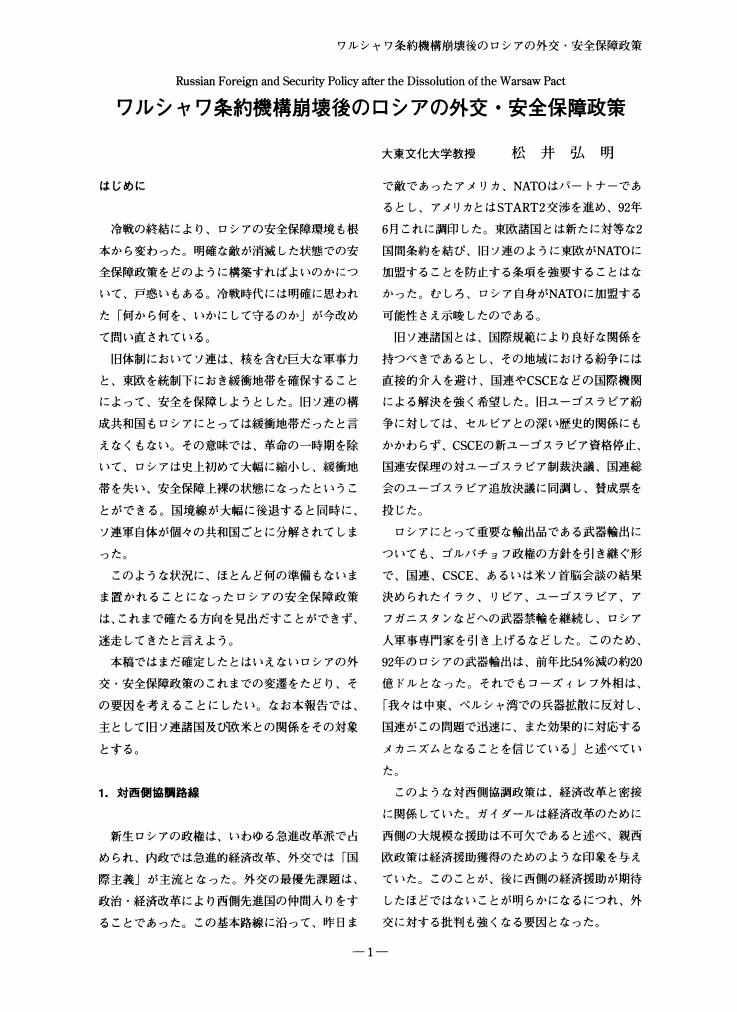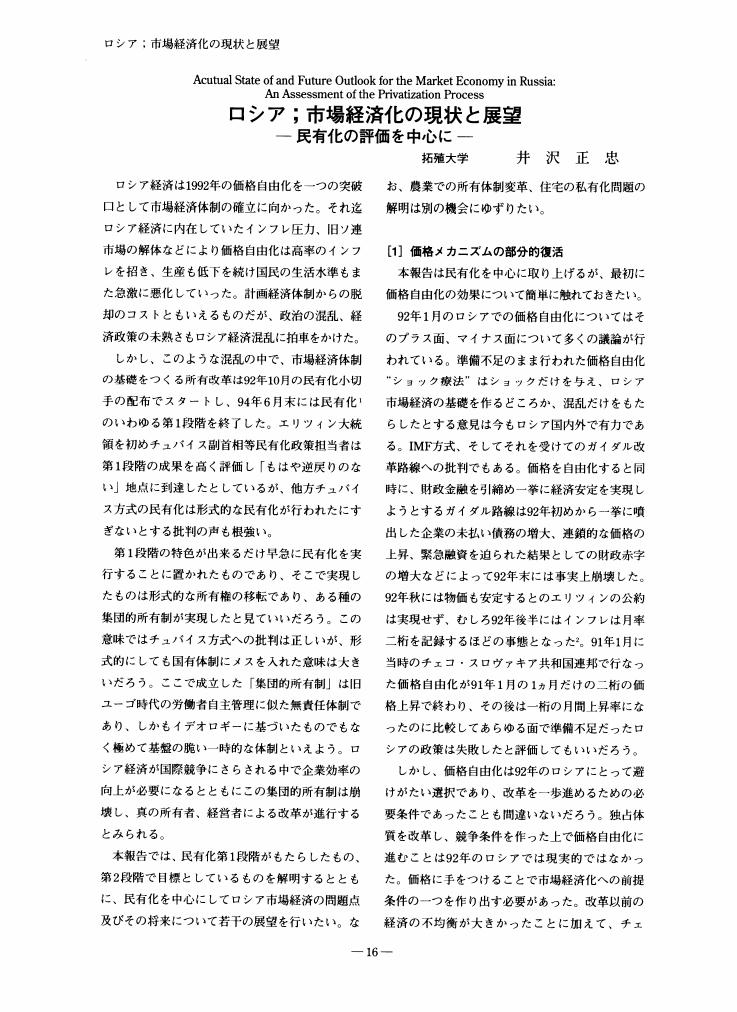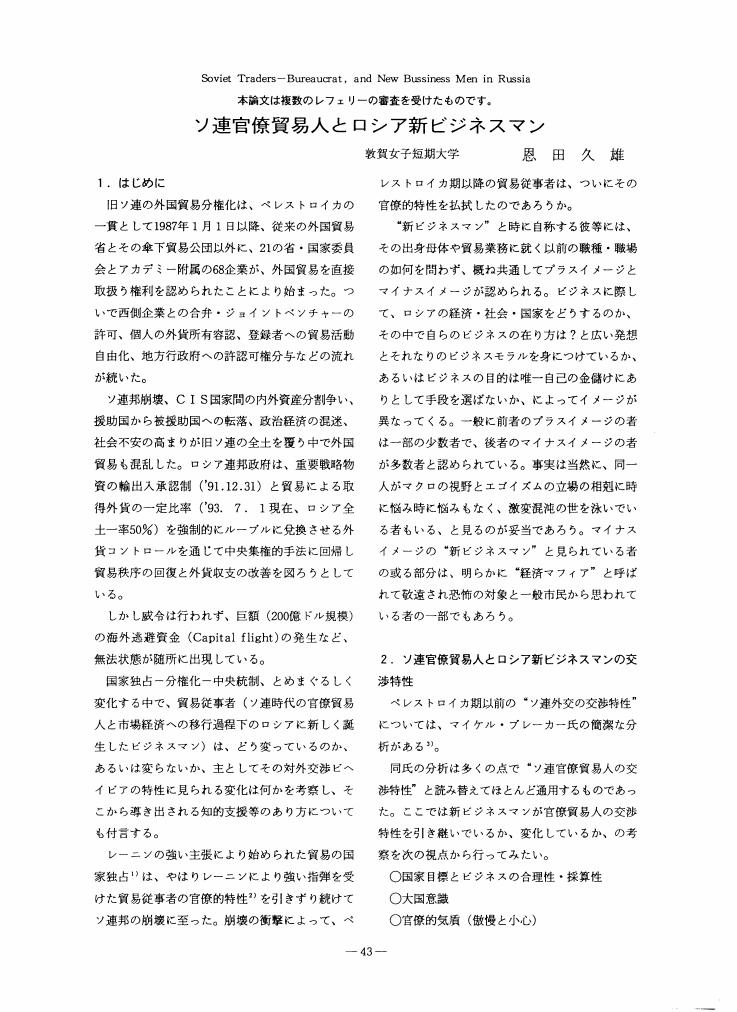1 0 0 0 OA 環日本海経済圏を目指して―ロシア極東との経済・地域交流の現状と展望
- 出版者
- ロシア・東欧学会
- 雑誌
- ロシア・東欧学会年報 (ISSN:21854645)
- 巻号頁・発行日
- vol.1994, no.23, pp.107-129, 1994 (Released:2010-05-31)
1 0 0 0 OA 社会主義経済計算論争の再検討
- 著者
- 吉田 靖彦
- 出版者
- ロシア・東欧学会
- 雑誌
- ロシア・東欧学会年報 (ISSN:21854645)
- 巻号頁・発行日
- vol.1993, no.22, pp.76-83, 1993 (Released:2010-05-31)
- 参考文献数
- 39
1 0 0 0 OA チェコの私有化
- 著者
- 小森 吾一
- 出版者
- ロシア・東欧学会
- 雑誌
- ロシア・東欧学会年報 (ISSN:21854645)
- 巻号頁・発行日
- vol.1993, no.22, pp.84-88, 1993 (Released:2010-05-31)
- 参考文献数
- 19
- 被引用文献数
- 1
1 0 0 0 OA 書評 近藤邦康・和田春樹編「ペレストロイカと改革・開放―中ソ比較分析」
- 著者
- 中西 治
- 出版者
- ロシア・東欧学会
- 雑誌
- ロシア・東欧学会年報 (ISSN:21854645)
- 巻号頁・発行日
- vol.1993, no.22, pp.106-108, 1993 (Released:2010-05-31)
1 0 0 0 OA ワルシャワ条約機構崩壊後のロシアの外交・安全保障政策
- 著者
- 松井 弘明
- 出版者
- ロシア・東欧学会
- 雑誌
- ロシア・東欧学会年報 (ISSN:21854645)
- 巻号頁・発行日
- vol.1994, no.23, pp.1-5, 1994 (Released:2010-05-31)
1 0 0 0 OA ポスト共産主義の政治思想の動向
- 著者
- 中村 裕
- 出版者
- ロシア・東欧学会
- 雑誌
- ロシア・東欧学会年報 (ISSN:21854645)
- 巻号頁・発行日
- vol.1994, no.23, pp.6-15, 1994 (Released:2010-05-31)
- 参考文献数
- 29
1 0 0 0 OA ロシア; 市場経済化の現状と展望 ―民有化の評価を中心に―
- 著者
- 井沢 正忠
- 出版者
- ロシア・東欧学会
- 雑誌
- ロシア・東欧学会年報 (ISSN:21854645)
- 巻号頁・発行日
- vol.1994, no.23, pp.16-26, 1994 (Released:2010-05-31)
- 参考文献数
- 38
1 0 0 0 OA エリツィン政権下のロシア・マスコミ
- 著者
- 鈴木 康雄
- 出版者
- ロシア・東欧学会
- 雑誌
- ロシア・東欧学会年報 (ISSN:21854645)
- 巻号頁・発行日
- vol.1994, no.23, pp.27-32, 1994 (Released:2010-05-31)
- 参考文献数
- 9
1 0 0 0 OA ロシアにおける市場経済化と経営者形成の現段階
- 著者
- 溝端 佐登史
- 出版者
- ロシア・東欧学会
- 雑誌
- ロシア・東欧学会年報 (ISSN:21854645)
- 巻号頁・発行日
- vol.1993, no.22, pp.1-14, 1993 (Released:2010-05-31)
- 参考文献数
- 22
1 0 0 0 OA ロシアの憲法問題
- 著者
- 松下 輝雄
- 出版者
- ロシア・東欧学会
- 雑誌
- ロシア・東欧学会年報 (ISSN:21854645)
- 巻号頁・発行日
- vol.1993, no.22, pp.15-26, 1993 (Released:2010-05-31)
1 0 0 0 OA 「混沌の中の宗教界」
- 著者
- 川端 香男里
- 出版者
- ロシア・東欧学会
- 雑誌
- ロシア・東欧学会年報 (ISSN:21854645)
- 巻号頁・発行日
- vol.1993, no.22, pp.39-41, 1993 (Released:2010-05-31)
1 0 0 0 OA ソ連官僚貿易人とロシア新ビジネスマン
- 著者
- 恩田 久雄
- 出版者
- ロシア・東欧学会
- 雑誌
- ロシア・東欧学会年報 (ISSN:21854645)
- 巻号頁・発行日
- vol.1993, no.22, pp.43-50, 1993 (Released:2010-05-31)
1 0 0 0 OA 「移行期 (ソ連からロシアへ) における新たな品質改善策」 ―工作機械工業を中心にして―
- 著者
- 五十嵐 則夫
- 出版者
- ロシア・東欧学会
- 雑誌
- ロシア・東欧学会年報 (ISSN:21854645)
- 巻号頁・発行日
- vol.1993, no.22, pp.51-59, 1993 (Released:2010-05-31)
- 著者
- 松里 公孝
- 出版者
- ロシア・東欧学会
- 雑誌
- ロシア・東欧学会年報 (ISSN:21854645)
- 巻号頁・発行日
- vol.2000, no.29, pp.49-71, 2000
- 被引用文献数
- 1
Kuchma's “cassette tape scandal” in 2000-2001 exemplified the patrimonial phenomena that has become prevalent in post-communist Ukrainian politics. However, this patrimonial tendency has not been combined with classic authoritarianism but machine politics (or ‘caciquismo’), in which election votes play a decisive role in intra-elite struggles for power. As a rule, caciquismo is based on independent meso-elites which function as mobilizers of votes and also as political brokers between localities and the center. Ukraine is not an exception, although in this country the meso-elites independence is masked by a constitutional unitarism and an appointment system of regional and ‘raion’ chief executives. Therefore, we need to pay attention to patrimony building at the regional level, which provides a social basis for strong regional electoral machines. <BR>I sampled four regions which contributed to Kuchma's victory in the 1999 presidential elections : Odesa, Transcarpathia, Donetsk and Dnipropetrovsk. Remarkably, despite previously sympathizing with the opposition, the electorate in these regions changed their political inclinations in the few years leading up to the 1999 elections. Along with the common tendency of electoral machines being based on the regional patrimony, a contrast was found with the extent to which this machine/patrimony had been legalized. This is the problem of regional party building. The development of a regional party system is determined by two factors :(1) intra-elite competition and,(2) interactions between party system levels. Regarding the latter, if infra-regional issues are converted into national political issues in a region, we can say that the interactions between party system levels have been activated. In 1994-98, Odesa Region experienced harsh infra-elite competition between its governor and Odesa mayor, but even in 1998 this conflict remained infra-regional (Kyiv only intervened sporadically). Donetsk and Dnipropetrovsk politics were forcibly nationalized in 1996 and after 1997 respectively, since the top leaders of these regions became rivals for Kyiv politicians (Donetsk governor Shcherban versus the then prime minister Lazarenko ; and the Dnipropetrovsk Soviet chair Lazarenko versus President Kuchma). Nevertheless, Kyiv could not divide these regions' elites. In Transcarpathia conflicts between the governor and the mayor of the regional capital Uzhhorod became nationalized in 1997-98 because the governor allied with the Medvedchuk faction of the Social Democratic Party of Ukraine (United), a typical legalized clan organization from Kyiv. In other words, only in Transcarpathia were the two conditions fully met and thus a formal party system was able to develop.
1 0 0 0 イデオロギー・システム・行動様式の変化と類似性
- 著者
- 横手 慎二
- 出版者
- ロシア・東欧学会
- 雑誌
- ロシア・東欧学会年報 (ISSN:21854645)
- 巻号頁・発行日
- vol.1996, no.25, pp.10-19, 1996
- 著者
- 宮川 真一
- 出版者
- THE JAPANESE ASSOCIATION FOR RUSSIAN AND EAST EUROPEAN STUDIES
- 雑誌
- ロシア・東欧学会年報 (ISSN:21854645)
- 巻号頁・発行日
- vol.1999, no.28, pp.92-99, 1999
1 0 0 0 ロシア (旧ソ連) のドイツ人―その歴史的運命について―
- 著者
- 福住 誠
- 出版者
- THE JAPANESE ASSOCIATION FOR RUSSIAN AND EAST EUROPEAN STUDIES
- 雑誌
- ロシア・東欧学会年報 (ISSN:21854645)
- 巻号頁・発行日
- vol.1994, no.23, pp.92-98, 1994












